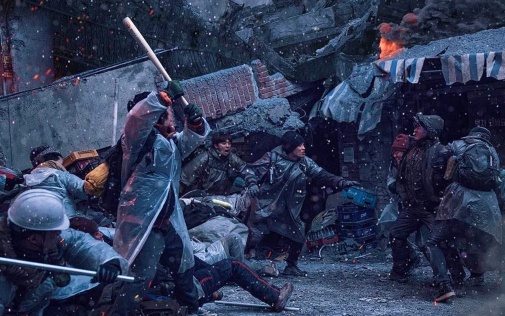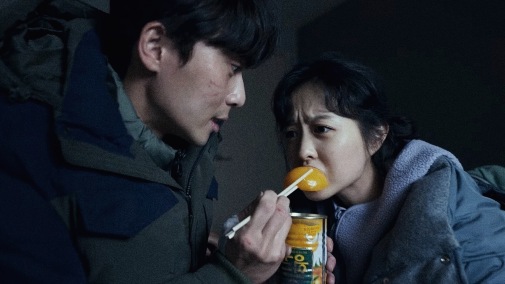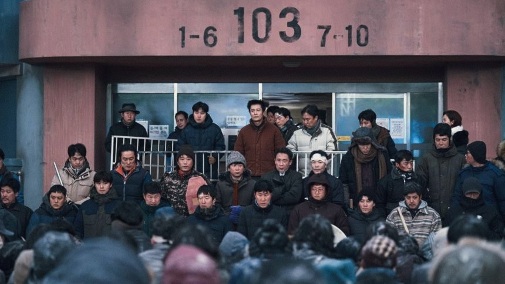TIFF '23: "Concrete Utopia" is an earth-shaking blockbuster parable
 Sunday, September 10, 2023 at 8:00PM
Sunday, September 10, 2023 at 8:00PM 
Genre cinema has long been the home of social critique through allegory. Think back to Godzilla's reflection on Japan's atomic trauma or Night of the Living Dead's invention of the zombie movie as the place to study civilization's collapse. South Korea's new Oscar submission, Concrete Utopia, follows the tradition. Though, here, you'll find no Romero undead or radioactive kaiju to distract and reflect human folly at the viewer. Instead, Tae-hwa Eom's latest tackles the precepts of the disaster flick with a dash of post-apocalyptic dystopia, showing Humanity's self-made ruin in the aftermath of a massive earthquake that renders Seoul a wasteland…
This ironically titled dystopia starts with a flurry of hopeful reminiscence, archival footage painting the dream of South Korean urban development in the 20th century. In a frenetic montage, we see Seoul rise into the skies, apartment buildings becoming more than just homes but status symbols, life goals, central tenets of a modern society always looking forward. As the editing reaches a fever pitch, the euphoric imagery transitions into drone footage flying sky-high above the capital in contemporary times. But, as the camera glances sideways, a massive wave of revolving earth passes through the metropolis.
Before we know it, the world is a devastated landscape, broken concrete as far as the eye can see, with smoke lines slashing the wintry sky. Bodies pepper the derelict fragments of city life, limbs poking out between broken walls. Only one building remains standing after the calamity, apparently untouched by the horror. It should be seen as a godsend, miraculous in every way. However, as we'll discover over the course of two hours, the Hwang Gung Apartments complex is divine punishment more than a mercy, its halls bound to uncover the worst in people and become hell on earth.

We enter it by following two of the community's youngest members, Min-seong (Park Seo-joon from Parasite) and Myeong-hwa (Park Bo-young). He's a public servant, and she a nurse, both dazed in the face of CGI Armageddon but trying to hold on to whatever remnants of normalcy they can scrounge up. Outside their door, non-tenants have set up camp, taking refuge in the building as a haven where they can keep themselves safe from the cold. An economy based on trading goods is established soon enough, money rendered useless in this new world order, and no rescue helicopters in sight. Cut off from the rest of Humanity, a horrible feeling starts to settle – that the whole planet is ruined.
One day, after the minor damage the building suffered has been repaired, a stabbing and explosion cause chaos among the residents, and the homeowners call an emergency meeting. A territorial mindset comes to the fore. Dehumanization in full effect, a sham vote takes place, where the group decides to evict the intruders, effectively condemning them to die in the freezing remains of Seoul. Kind-hearted Myeong-hwa objects, but it's useless, especially when their elected Delegate Yeong-tak (Korean superstar Lee Byung-hun) takes power. Though nobody remembers him inhabiting the apartment he claims for himself, the shine of a strong leader is hard to resist. A figurehead to the tenants, Min-seong becomes loyal part of his police forces. This make-shift society is silently condemned by the hungry camera which captures their vilest impulses as a synecdoche of a rotten society.
Like its forbearers in cinematic tradition, Concrete Utopia does away with subtlety early on, preferring a blunt approach to social critique. At one point, the Delegate will explain to Min-Seong that "the strength of a nation derives from the integrity of the home," imbuing the tenants' tribalism with the shine of patriotism. The worst thing you can do is question the group's righteousness, their prerogative as hard-working 'chosen people,' an absolute truth that allows no dissent, not even a glare. One can see nationalist politics in the filmmaker's crosshairs, though making an outside interloper into the main antagonist muddles the rhetoric slightly.
Then again, one of Tae-hwa Eom's greatest tricks relies upon the audience's implication as an accomplice to the tenants' pseudo-democratic barbarism. It comes in the usual ways, like fourth-wall breaks during inspirational montages to include the viewer in the group's internal dynamics. An excitable soundtrack makes sure to manipulate euphoria out of the audience even when that feeling tastes like ash. The outsiders are portrayed with enough grotesquerie to be repellant on a visceral level. The spectator's culpability goes further, though. Concrete Utopia is one of those films that makes you yearn for punishment, for a merciless end to come quickly.

We're so caught up in hating the tenants we don't realize our compassions are being stripped away. Soon, wrath overwhelms, and nihilism wins. Is that worth an asphyxiating watch with little insight beyond the most basic conclusions about modern vices and social hypocrisies? Maybe not, but Concrete Utopia has enough epic-scaled idiosyncrasies to keep you on the edge of your seat, even if the story's conclusions are foreseen a mile away.
Tonally, Concrete Utopia is a wild animal prone to breaking out in fits of energized madness, zooms, and wide lenses, setting some pyretic spectacle before a punch of solemnity destabilizes everything. A penchant for operatic Christian imagery also delivers striking sights to the Korean dystopia, culminating in the picture of a stained-glass window looking on the modern counterparts of Adam and Eve, gone from a spoilt Eden that was always Hell in weak disguise.
Concrete Utopia will represent South Korea in the upcoming Best International Feature Film Oscar race. No US Distribution has been announced but having already sold to hundreds of countries hat's sure to come.


